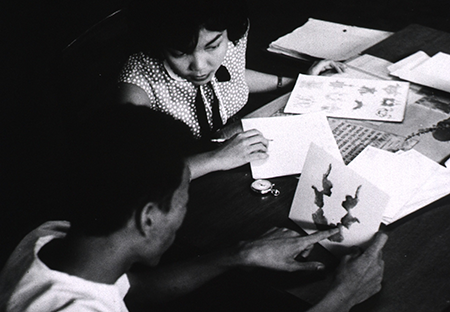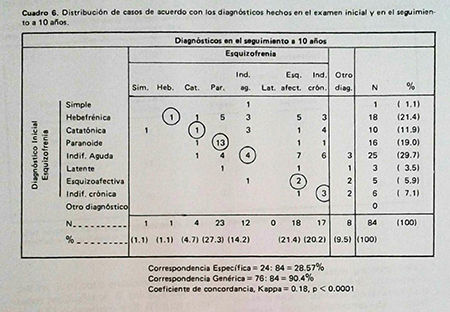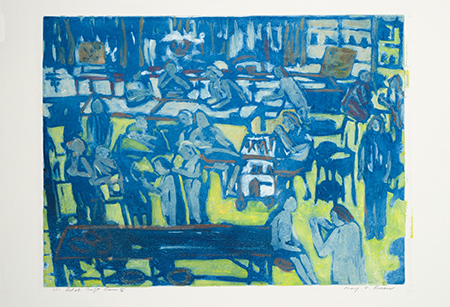Research themes
The project’s four thematic clusters address the two most important leitmotifs of early transcultural psychiatry: the universality vs cultural specificity debate, and the pathological potentials and changing meanings of cross-cultural encounters. These two themes will provide insight into the close relationship between transcultural psychiatry and the process of decolonisation. They will be combined with micro-historical research on core aspects of psychiatric clinical spaces and encounters – the development psychiatric research instruments, and the cross-cultural construction of the figure of a patient: this will provide an opportunity to write a global and intellectual history of broad thematic areas from below and with reference to specific sites, personalities and experiences.
 Did transcultural psychiatry’s post-colonial quest for universal norms of mental health lead to Eurocentric clinical theory and practice? To what extent was transcultural psychiatry ideologically removed from the colonial psychiatric frameworks? Were the normative models of race, culture and humanity reconceptualised in the second half of the twentieth century, and what was the role of non-Western actors in this process? The notion of universality has remained central to postcolonial discussions about not only mental health but also human rights, democracy, migration, humanitarian intervention, and this project will offer a critical exploration of the social, political and cultural factors which shaped its development in the second half of the twentieth century.
Did transcultural psychiatry’s post-colonial quest for universal norms of mental health lead to Eurocentric clinical theory and practice? To what extent was transcultural psychiatry ideologically removed from the colonial psychiatric frameworks? Were the normative models of race, culture and humanity reconceptualised in the second half of the twentieth century, and what was the role of non-Western actors in this process? The notion of universality has remained central to postcolonial discussions about not only mental health but also human rights, democracy, migration, humanitarian intervention, and this project will offer a critical exploration of the social, political and cultural factors which shaped its development in the second half of the twentieth century.
 The project will use the IPSS to critically explore the development and adjustments of research instruments which are still employed to ensure the cross-cultural portability of psychiatric knowledge: mental health films; interview protocols and manuals; patient questionnaires and tests; rating and assessment scales; statistical instruments for transcultural psychiatric epidemiology; and diagnostic manuals and classifications - transnational dictionaries of psychiatric concepts. It will explore how these instruments have been employed, debated, critiqued and revised since WWII, and how they shape cross-cultural psychiatric encounters in today's world. The project will provide a social and cultural (micro-)history of the core mental health research and diagnostic instruments and epidemiological categories, and shed light on the role of non-Western actors (and patents) in their development.
The project will use the IPSS to critically explore the development and adjustments of research instruments which are still employed to ensure the cross-cultural portability of psychiatric knowledge: mental health films; interview protocols and manuals; patient questionnaires and tests; rating and assessment scales; statistical instruments for transcultural psychiatric epidemiology; and diagnostic manuals and classifications - transnational dictionaries of psychiatric concepts. It will explore how these instruments have been employed, debated, critiqued and revised since WWII, and how they shape cross-cultural psychiatric encounters in today's world. The project will provide a social and cultural (micro-)history of the core mental health research and diagnostic instruments and epidemiological categories, and shed light on the role of non-Western actors (and patents) in their development.
 Through close-reading patient case histories from selected IPSS research centres (and other clinics where cross-cultural encounters occurred), the project will explore how the key discussions in transcultural psychiatry shaped the imagination and regulation of clinical encounters between psychiatrists and patients, and recover patients' voices, experiences and interventions. What kinds of imagined subjects were envisaged in therapeutic or research spaces? How was the ‘cultural gap’ between non-Western patients and Western psychiatry perceived and addressed? This aspect of the project will explore the global history from below, assessing how major global developments and the end of empire affected everyday lives and practices of patients and clinicians, and how clinical encounters and patients’ input and resistance in turn shaped such global trends.
Through close-reading patient case histories from selected IPSS research centres (and other clinics where cross-cultural encounters occurred), the project will explore how the key discussions in transcultural psychiatry shaped the imagination and regulation of clinical encounters between psychiatrists and patients, and recover patients' voices, experiences and interventions. What kinds of imagined subjects were envisaged in therapeutic or research spaces? How was the ‘cultural gap’ between non-Western patients and Western psychiatry perceived and addressed? This aspect of the project will explore the global history from below, assessing how major global developments and the end of empire affected everyday lives and practices of patients and clinicians, and how clinical encounters and patients’ input and resistance in turn shaped such global trends.
The project will explore how, in the new highly interconnected post-war world, transcultural psychiatry sought to radically rethink the nature and possible consequences of intense transcultural connections, and to offer a framework for understanding and handling cross-cultural communication. While post-war global psychiatry viewed itself as the main facilitator of peaceful and productive cross-cultural communication, it still understood cultural change and cross-cultural contact as a source of mental pathology and distress. I will analyse transcultural psychiatry’s fundamental assumptions and dilemmas in order to understand this major contradiction at the core of its mission.
